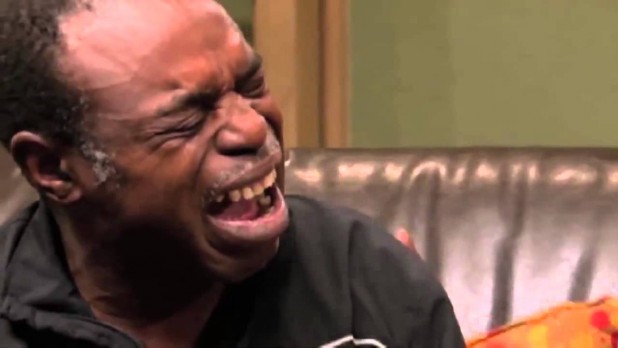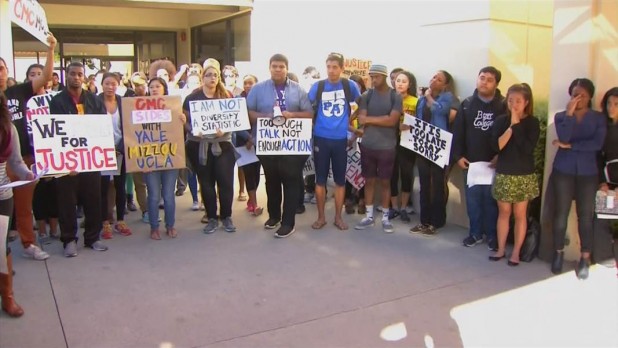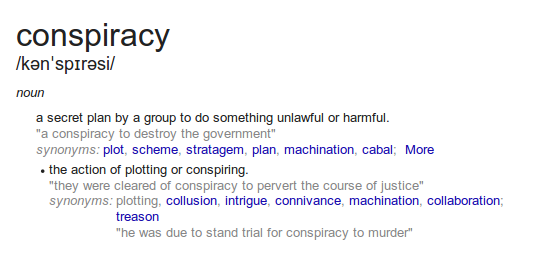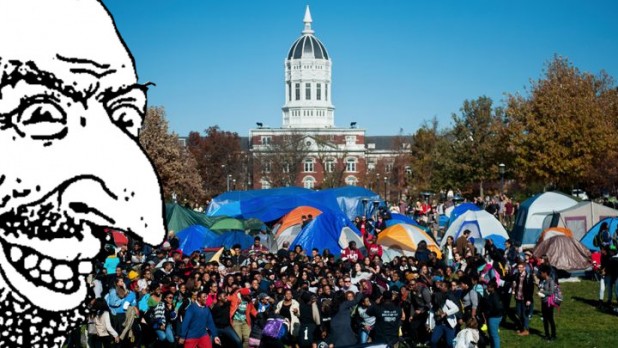Andrew Anglin
Daily Stormer
November 18, 2015

If you, like most, want to be against racism but don’t really exactly understand what it even is, never fear. The New York Times has you covered. They have compiled a readers’ list of Nuremberg-type claims from Black students about the horrible treatment they experience from White when they be up in the school.
These are the type of things they are rioting over. We need to listen to their stories.
Let’s look at a few of them.
Please remember that it doesn’t matter if any of this actually happened in real life. What matters is that it was real in their minds.
Objectionable Costume
Halloween weekend, a group of friends and I were hanging out. As Native students, we stuck together. What was originally a fun night out quickly turned sour when I saw a white girl in a “Pocahottie” costume. We had seen plenty of redface costumes before, but we felt an obligation to say something. My friend confronted her and said, “Hey, you know your costume is pretty messed up, right? Especially when you wear it in front of a group of Native Americans.” To which the girl laughed and said: “How. I come in peace.”The story ended up getting lost in the mix of other racially tense Halloween stories that happened at Harvard. No administrative response, no comment from race relations tutors, no email from the house masters. Racism was left unquestioned, and unaccounted for. — Kapena, Harvard University
How could anyone imagine it is okay to dress-up like someone from a different place?
smdh 2015.
Singled Out in Class
I was one of two black students in the class of more than 20 people. We studied William Grant Still, one of the first black composers. The textbook featured a poem he had written sometime in the 1920s, written as a black man from the ’20s spoke (dem instead of them, der instead of there). The Caucasian professor asked me to read the poem aloud, which I did in the way that I usually speak. The professor then said: “No. Do it again. You know how it’s supposed to sound. I can’t read it because that’s not my culture.” — Maya Bird-Murphy, Ball State University
I can totally picture this happening IRL.
smdh 2015.
Feeling Invisible
In the 1970s, I was standing with three white guys when the president of the dorm, a white girl who was dating a black guy, came to discuss a dorm party. As she left and was out of earshot, one of the white guys called her a n——r lover. First, it was a brazen display of bigotry, but secondly, what was it about me that made him forget I was black and standing right next to him? — Murray Hough, University of Connecticut
That’s not only racism – it’s sexism. Women have a right to have sex with as many different kinds of people as makes them feel good, and no patriarchy has a right to mutter about it.
smdh 2015.
‘Power of Microaggressions’
As a freshman I decided to join a [traditionally white] sorority. After a Q. & A. session, parents and guests had the option of asking me or a white student about Greek life on campus. One woman asked her question, I began to answer, and as soon as the other girl finished her conversation, the woman walked away from me without a word, midsentence. No one else on my team seemed to care much or understand why I was hurt.The situation really opened my eyes to the power of microagressions, and taught me that in an environment that is loving and inclusive, racism is still prominent in everyday life. — Yasmina Taylor, DePaul University
Someone asked a different person a question and no one noticed?
smdh 2015.
Racism or Something Else?
I never witnessed direct or blatant discrimination at my predominantly white university, but as an Asian-American, I felt subjected to microaggressions daily. White students assumed that I only associated with Asians, asked where I was “from,” and if I was “North or South Korean.” Black students told me I did not count as a student of color and questioned if Asians even had the right to participate in diversity initiatives due to the “model minority” stereotype. Korean international students let me and other Korean-Americans like me know they did not consider us Korean or Asian enough. In short, racial conflict became such an ingrained part of my college experience that it became difficult for me to discern when people were behaving or addressing me in certain ways because of race as opposed to another motive. — Hannah Kang, Georgetown University
Wait, Blacks discriminated against an Asian? That doesn’t really fit here, NYT.
Making an Assumption
I am Hispanic. I was out with some friends and we met some guys. One of the guys stated: “You’re not American. Where are you from?” I told him I was indeed American and from New York. I could tell he was uncomfortable after that. — Joanna Carrasco, Pennsylvania State University
Can’t believe that in current year, someone would think someone else was from a different place than they’re from.
smdh 2015.
A Dormitory Altercation
In 1975, I was moved into a room with a raging racist. She freely used words that were offensive. I pretty much ignored her because it was a short summer session and only one dorm was open. One day a group of black women were blocking the entrance and were engaged in a verbal altercation with my roommate. Several were in tears, and clearly hurt by my roommate. I tried to intervene but was told to butt out, that this wasn’t my fight. Eventually the resident assistant came and broke things up.Nothing happened. No action was taken by the R.A. She told everyone to not speak to each other. — Linda Warren Seely, University of Memphis
smdh 1975.
Confronting Racist Attitudes
My African-American roommate brought her friends to our dorm. One of them had been eating a sticky bun and wanted to use our sink to wash his hands. One of our suitemates was doing her hair at their sink. Her mom was there with her. An hour later, we get a rap at the door and it’s the campus police, who told us a mother had called in alarm because she was worried her daughter would get jumped in bed by a gang of black males. That was the last straw for my roommate, who transferred. — E., William Paterson University
Thinking a group of Black males are a danger to White women?
smdh 2015.
Moment of Understanding
As a professor, I have heard the many stories of my students. I am white and privileged not to have experienced racial conflict myself. I address it in class. Most students begin to understand racism by looking through the lens of the other person. It is an “aha” moment for them. Most students “get” the individual racism, but have a more difficult time understanding institutional racism. — Thomas Costello, Ohio University
People are feeling feelings?
smdh 2015.
No Response
Black students and allies organized a Blackout Week demonstration. There has been almost no administrative or campuswide response to Blackout Week or the racial issues on campus. We are a predominantly white, male college, and students tend to be complacent toward or complicit in racial issues. — Erin Wade, Union College
No one even resigned when you protested?
smdh 2015.
‘Talk. Promises. No Change.’
A white colleague dismissed my call for a campus affirmative action plan as equivalent to requiring the college to hire an unqualified “Benito Taquito.” A white student asked in class why black students would be upset by hearing the song “Carry Me Back to Old Virginny.” One administrator told a committee on diversity last year that the university would be wasting its time creating an affirmative action plan since “no black people would want to live in Roanoke.”Students have protested, had a “die in,” attended forums on diversity, circulated fliers. I’ve fought hard for creation of an affirmative action plan on campus to no avail. The result? Talk. Promises. No change. — Susan Thomas, Hollins University
Again, no resignations even after someone said something that hurt someone’s feelings.
smdh 2015.
How to Respond
I’m currently the vice president of the student body, and the president and I ran on the same ticket as the first two women of color to serve the organization in our roles. During the campaign, there were several anonymous comments found on Yik Yak and on our newspaper’s online articles regarding our race and gender. I was described as a Chinese nationalist, and a chink. I’ve struggled to respond in a way that creates a learning opportunity. I’m not interested in creating a more hostile campus climate, but I also resent the fact I’ve often stayed quiet in fear that my words aren’t powerful enough to explain what the lesson is, and why it’s significant. — Jane Hong, Syracuse University
Anonymous people saying something mean on the internet?
smdh 2015.
Lots of Asians responding, even while this is predominantly a Black issue. It’s almost like not very many Blacks read the New York Times. Are they racists?
Eye-Opener
Attended SUNY Plattsburgh in the mid-1960s, one of four people of color. After a minor traffic accident, I was taken to the sheriff’s office and issued a $50 ticket. When he found out I was from the college, he said, “You should have told me earlier,” indicating that the outcome might have been different and more in my favor. He added, “Thought you were one of the boys from the Air Force base outside town.” My experiences in upstate New York were a bit of an eye-opener for me. — Owen Levy, SUNY Plattsburgh
smdh mid-1960s.
On Public Property
A man who refers to himself as “Superman” stood on campus waving his Confederate flag, rode in his car around campus waving his flag and stood across from the dorm that houses international students. Many students felt unsafe, but because he has “freedom of speech” and was “on public property” he was not forced to leave. — Brianna Carey, St. Cloud State University
Not shutting down freedom of speech when Blacks have feelings?
smdh 2015.
Mistaken Identity
It was 1980. I’m Latina, and I was walking home from class in the wintertime with a scarf over my head. This was during the Iran hostage crisis. A pickup truck drove by twice, and the second time the people inside tossed cans of beer at me and shouted, “Go back to Iran.” This instance reminded me that no matter where I am in America, my ethnicity makes me “other.” — Tanya Maria Barrientos, University of Missouri
smdh somewhere between November 4, 1979 and January 20, 1981.
Seriously Though
I didn’t quote all of them. You can go read them. But this is nuts.
We see all these Blacks basically rioting on these campuses, and the media is like “yeah they’re angry because people are doing racism against them,” and people are like “but what specifically though?”
So NYT puts out a call for people to submit specific instances of racism, and people are like “one time someone called me a mean name,” “one time someone didn’t ask me a question,” “one time someone said something mean about me on the internet.”

They should not have published this. They should have left it vague, and led people to believe that the KKK was burning crosses and lynching Blacks on campus. This just looks horrible, that they are making all of these demands and their complaints are so nonsensical.
Even if people saying mean things is as serious a problem as the media is claiming, there isn’t anything that can be done about it.
The idea that there can be an institutionalized solution to name-calling by random people at a school is insane. Presumably, the schools all already have policies where you can get punished for discrimination if you’re a student and it’s reported that you called someone a racial slur. What more can possibly be done? What are they asking for?
They just want Whites to apologize and resign because… I don’t know?
Do they actually even want that? Or is it just the Jews stirring them up? How does any of this protesting serve the interests of Blacks? What are they trying to achieve?
Again with this NYT list of complaints, we see that racism is being defined as a conspiracy to hurt people’s feelings. Is there any evidence of this conspiracy, beyond claims of random people saying mean things?
I am an actual racist, in that I believe White people have a right to their own countries. But I don’t go around calling people names or trying to hurt their feelings – what purpose would that serve?
What is the implication here? What are they alleging the conspiracy is trying to achieve? Is the end of the conspiracy to make colored people feel bad?
Why?
This is all just plain gibberish.
And it is the Jews. As I recently proved with my trolling of the #PrayForMizzou hashtag, you can get Blacks to go along with anything. These people are incredibly stupid.
The Jews are using these dumb Blacks as a battering ram against White America.
 Daily Stormer The Most Censored Publication in History
Daily Stormer The Most Censored Publication in History





